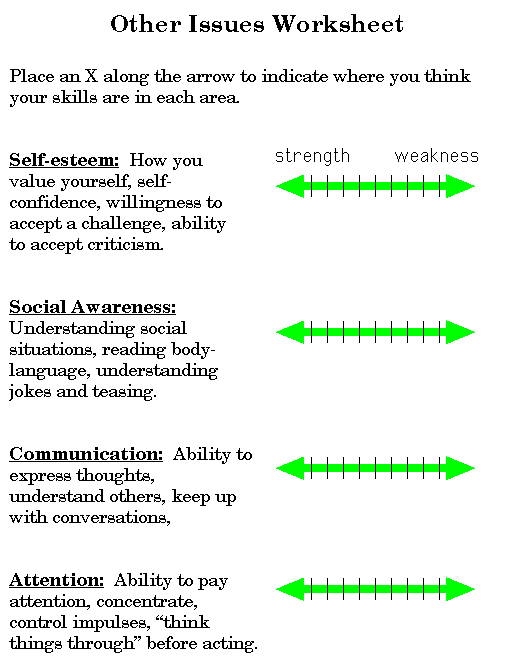Other Issues Related to LD
Words to know for chapter 9:
Self-esteem - how you feel about or 'value' yourself
Communication - sharing information with others
Fear-of-failure- afraid to try because you might fail
Withdrawn- staying to yourself, avoiding others
Obnoxious- being annoying or offensive
Resistant- not wanting to do something
Body language- using your body to show how you feel
Impulsive- jumping into things without thinking

'We have learned a lot about your learning difficulties. But now it is time to investigate other issues that LD students face.'
When you have a learning disability you obviously have trouble learning. But along with the learning problems come other difficulties that can interfere with your life, both in and out of school.
We will focus on four very common problem areas related to learning disabilities:
Social confusion
Communication
Attention
Low Self-esteem is probably the biggest and most common emotional problem that people with learning disabilities have. When you have trouble learning, you lose confidence in yourself and develop low self-esteem. This probably starts out in school, where you have the most difficulty, but often carries over into other situations.

•When you have low self esteem you might be afraid to try new or difficult things including:
relationships
sports
games
conversation
This is called 'fear-of-failure' because you are afraid to try things because of fear you might fail.
•Or, you may intentionally do poorly (even on things you can do well) so that others (parents, teacher, friends) learn not to expect too much from you. This is called 'fear-of-success'.
•You may become shy and withdrawn to avoid threatening situations.
•You may become 'obnoxious' attempting to show others how smart you really are.
•You may become angry and resistant when asked to do things that are difficult.
•You may become aggressive (fighting) when you feel embarrassed by your difficulties.
•You may act lazy and unmotivated to make it appear that you could do well in school, if you wanted to.
All of these behaviors are 'normal' attempts to hide your difficulties and improve your low self-esteem. Unfortunately, these behaviors only make things worse.
The best things for you to do to improve your self-esteem are:
•Learn to accept your learning disability.•Push yourself to try new things. You might be surprised at how well you can do.
And most important:
•Don't waste your energy hiding your learning disability from others!!
Social confusion is an area of difficulty for many LD students because their processing disability can make it difficult to understand some social situations. You may:
- have difficulty 'reading' body language or facial expressions
- misunderstand 'normal' teasing and joking
- overreact to situations
- exaggerate situations and events
- react with impulsive behavior instead of 'processing'
- react too slowly to situations and 'be left out'

Social confusion can be extremely frustrating. You may feel 'weird' because you act and react differently than other students. You may need to work extra hard to really understand situations and react more 'normally'.
Communication is another very important issue for people with learning disabilities. Because you struggle to process information, you may have difficulty expressing your thoughts and understanding others.
Communication confusion can cause difficulty with all types of relationships including:
family
teachers
coaches
etc.
•When you have trouble communicating you may avoid social situations because of difficulty with 'small talk'.
•You may react to difficult situations with aggression instead of 'talking things through'.
•You might avoid making friends because of fear that you won't be able to communicate.
•You may appear unfriendly to others.

Difficulty with communication can cause frustration for you and people around you. If you have difficulty in this area, it is very important for you to be open and honest about your communication struggles so that others can be aware and supportive.
Attention is an area of difficulty for almost all LD students. You may have difficulty paying attention both in the classroom and when doing homework.
As we learned in chapter 7, sometimes attentional difficulties are caused by a medical condition called attention deficit hyperactivity disorder (ADHD). Many LD students have ADHD and may take medication to help control behavior and pay attention.
Other students with learning disabilities have difficulty paying attention in school but do not have ADHD. Sometimes these students have simply learned to 'tune out' when learning becomes very frustrating. Other times an LD student's 'processing style' causes difficulty with attention.
For example, students with a 'sequencing' disability have difficulty paying attention to details and organizing bits of information (during a lecture, demonstration, or while reading) but are very aware of (and distracted by) everything else going on around them. Such students can pay attention better when the teacher provides a general idea about what is being taught before breaking it down into details. Students with an 'auditory' disability tend to 'drift off' during lectures but 'tune in' better to videos or demonstrations.

•If you have attentional difficulties, you need to work very hard to say 'tuned in' to classroom instruction.
•You might have difficulty controlling impulsive behaviors and may say or do things before you have a chance to 'think things through'.
•Friends may get frustrated by your lack of self-control.
•Parents and teachers may lose patience with your apparent lack of motivation or 'disinterest'.
Attentional problems make it very difficult to learn in school. Don't be afraid to ask to have information repeated if you 'missed it'.
'It seems that low self-esteem, social confusion, communication problems, and attentional difficulties are very common for LD students. Are these problem areas for you?'
The best thing for you to do to 'counteract' these problems is to be as open and honest as you can be about your learning disability and any 'related problems' you may have.
When you can really admit your learning difficulties to others you will find that you no longer need to be embarrassed or ashamed.
You will also find that friends, parents, and teachers are more accepting and supportive when they really understand your struggles.

'Now, on with the case.'
Review questions:
1. What are the four problem areas discussed in this chapter?
2. How can low self-esteem interfere with learning?
3. How can low self-esteem interfere with sports?
4. What is 'fear-of-failure'?
5. What is one thing you can do to improve your self-esteem?
6. Why do LD students often have trouble with communication?
7. Why is communication important for relationships?
8. Why do most LD students have trouble paying attention in school?
9. What is the medical condition discussed in this chapter that sometimes causes attentional difficulties?

Return to the LDinfo Web Site to find out about any of the following topics (and more):
Learning disabilities - what is a learning disability (LD or SLD)?
Dyslexia: Dyslexia is a reading disability or reading disorder
Dysgraphia Dysgraphia is a writing disability or disorder
Dyscalculia Dyscalculia is a math disability or disorder
What is an attention deficit disorder (ADD, AD/HD, ADHD)?
Gifted LD: Can a student be gifted and LD?
Emotional/Behavioral issues and LD: Do LD students experience behavior problems or depression?
Section 504: What is a Section 504 plan?
What is special education?
What is processing?
What is a severe discrepancy?
What is a nonverbal learning disability (nonverbal LD or NLD)?
What is a central auditory processing disorder (CAPD)?
Uncovering the Mysteries of your Learning Disability
Order printed copies of this manual
- Chapter 1 - What is a Learning Disability?
- Chapter 2 - What Causes Learning Disabilities?
- Chapter 3 - Discrepancy = Underachievement
- Chapter 4 - Processing: The Sensory Channels
- Chapter 5 - Processing: The Cognitive Channels
- Chapter 6 - Processing: Sensory + Cognitive
- Chapter 7 - LD Jargon
- Chapter 8 - Using Accommodations
- Chapter 9 - Other Issues Related to LD
- Chapter 10 - Intelligence vs IQ
- Chapter 11 - Exercizing Your Weakness
- Chapter 12 - LD and the Law
- Chapter 13 - Becomming an Effective Self-Advocate
- Chapter 14 - Planning for Your Future
- Chapter 15 - The Summary
Copyright © 2006-2017 LDinfo Publishing
All rights reserved. Any reuse or republishing of the text
or images on this web site without prior written consent of
the copyright holder is prohibited.